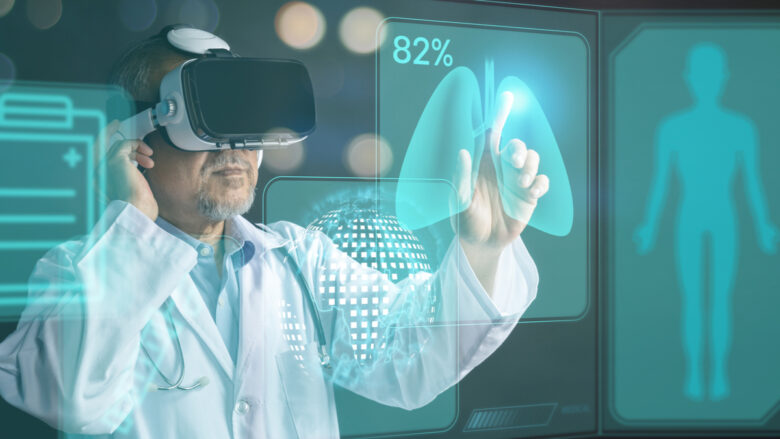Healthcare is one of the many industries rapidly changing in the Metaverse. As we enter a new era of technological advancement, the healthcare industry is embracing new aspects of patient care, medical education, and telemedicine through the use of virtual reality (VR), augmented reality (AR), and artificial intelligence (AI). The Metaverse has the potential to revolutionize the way physicians treat patients, perform surgeries, and manage the healthcare system. From virtual consultations to intensive training environments, the possibilities are endless. In this article, we explore how the Metaverse is transforming healthcare and the prospects for integrating this groundbreaking technology into medicine.
Transforming Telehealth and Patient Consultations:
The development of telemedicine has demonstrated the potential of digital healthcare, but the Metaverse takes it a step further. Patients can meet with their doctors in an immersive virtual environment instead of a standard video call, making the consultation more in-depth and engaging. Artificial intelligence avatars can help patients communicate, reduce wait times, and improve the effectiveness of diagnostic procedures. Additionally, haptic technology can bridge the gap between online and in-person consultations by enabling remote physical testing.
Medical Education and Training in the Metaverse:
Medical education and training is one of the most exciting applications of the Metaverse in healthcare. Using virtual reality simulation, trainees can practice difficult surgical techniques in a risk-free environment, providing an unparalleled learning experience. These simulators hone their skills before actually entering the operating room. Additionally, medical professionals can collaborate with experts from around the world in virtual meeting rooms, sharing research and expertise in real time. 3D models provide deeper insights into the human body and improve anatomical learning, diagnosis, and treatment planning.
Robotics and Surgical Innovation in the Metaverse:
The combination of robotic surgery and the Metaverse is poised to revolutionize the way surgery is performed. By controlling robotic arms with virtual reality goggles, surgeons can perform surgeries with unprecedented precision. The technology enables minimally invasive surgery, resulting in better patient outcomes and shorter recovery periods. To ensure rural areas have access to quality care, telesurgery—surgery performed by skilled surgeons thousands of miles away—will become increasingly common.
Therapy and Mental Health in Virtual Environments:
The Metaverse is revolutionizing the treatment of mental health conditions. Patients with depression, post-traumatic stress disorder, and anxiety disorders have benefited from virtual reality therapy. An immersive environment can help patients safely face their concerns, improving treatment outcomes. People can connect and heal in a safe space through virtual support groups led by certified therapists. Additionally, AI mental health robots are improving overall health by providing guided meditation sessions and direct emotional support.
Transforming Physical Therapy and Rehabilitation:
Physical therapy and rehabilitation have also been greatly aided by the Metaverse. Patients recovering from surgery or injury can use VR-based rehabilitation activities to increase effectiveness and engagement in treatment. These online environments are improving rehabilitation outcomes by motivating patients to adhere to their treatment plans. AI monitoring tools can also closely monitor the progression of a patient’s disease and adjust treatment plans as needed to ensure personalized recovery.
Blockchain in Healthcare: Secure and Open Medical Records
Accessibility and data security are two of the biggest issues facing healthcare. Metaverse uses blockchain technology to ensure the secure and convenient storage of medical records. Decentralized healthcare solutions ensure that only authorized professionals have access to patient data while giving patients more control over their medical history. This reduces the risk of data breaches and increases openness.
Medicine and Drug Development in the Metaverse:
The pharmaceutical industry is also using the Metaverse for drug discovery and development. Using virtual simulations, researchers can explore drug efficacy, molecular interactions, and disease progression in a three-dimensional environment, reducing the time and cost of traditional clinical trials. AI analytics can provide greater insight into potential treatments, accelerating the development of life-saving drugs.
Challenges and Moral Dimensions:
Despite the enormous potential of the Metaverse in healthcare, obstacles remain. To ensure broad adoption, concerns about privacy, government consent, and accessibility challenges must be addressed. To maintain integrity and trust in the system, ethical issues such as data ownership, patient consent, and AI-based diagnostics must be strictly regulated. Furthermore, bridging the digital divide is crucial to ensure equal access to this advanced technology for all patients.
The Promise of the Metaverse for Healthcare:
As technology continues to evolve, the Metaverse will play a major role in healthcare. Continuous innovation will make AI diagnostics, virtual hospitals, and greater patient engagement a reality. The future of healthcare will be shaped by collaboration between digital companies, healthcare providers, and regulators, making healthcare more patient-centric, efficient, and accessible. The metaverse is more than just a futuristic idea; it is a revolutionary force that will change the way we think about healthcare.
FAQs:
1. How can the Metaverse improve healthcare?
Through immersive telemedicine, advanced medical education, robotic surgery, and AI-driven diagnostics, the Metaverse improves patient outcomes and accessibility of healthcare.
2. Can virtual reality be used to train medical professionals?
Medical professionals and students can practice surgical procedures, diagnoses, and patient interactions in a safe, regulated environment using virtual reality simulations.
3. What are the security risks of using the Metaverse in a medical setting?
Blockchain technology and strict cybersecurity procedures can help mitigate security risks such as data breaches, patient privacy concerns, and unauthorized access to medical records.
4. How can the Metaverse help treat mental health conditions?
Metaverse offers immersive exposure therapy, virtual therapy sessions, and an AI mental health bot that provides immediate emotional support and guidance.
5. Can all patients use the Metaverse technology?
The Metaverse has great potential, but accessibility remains a problem. To close the gap, we must work to ensure access to technology and digital literacy programs and develop an international infrastructure.




